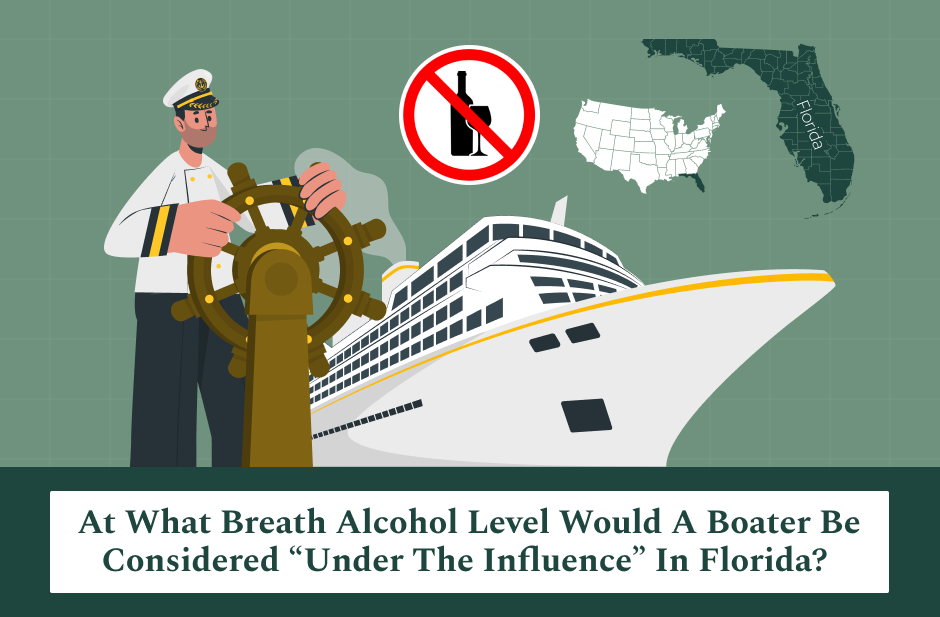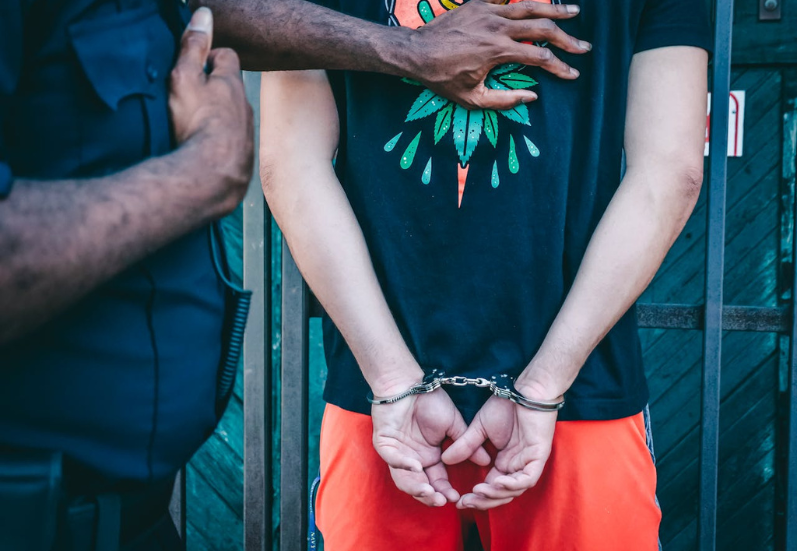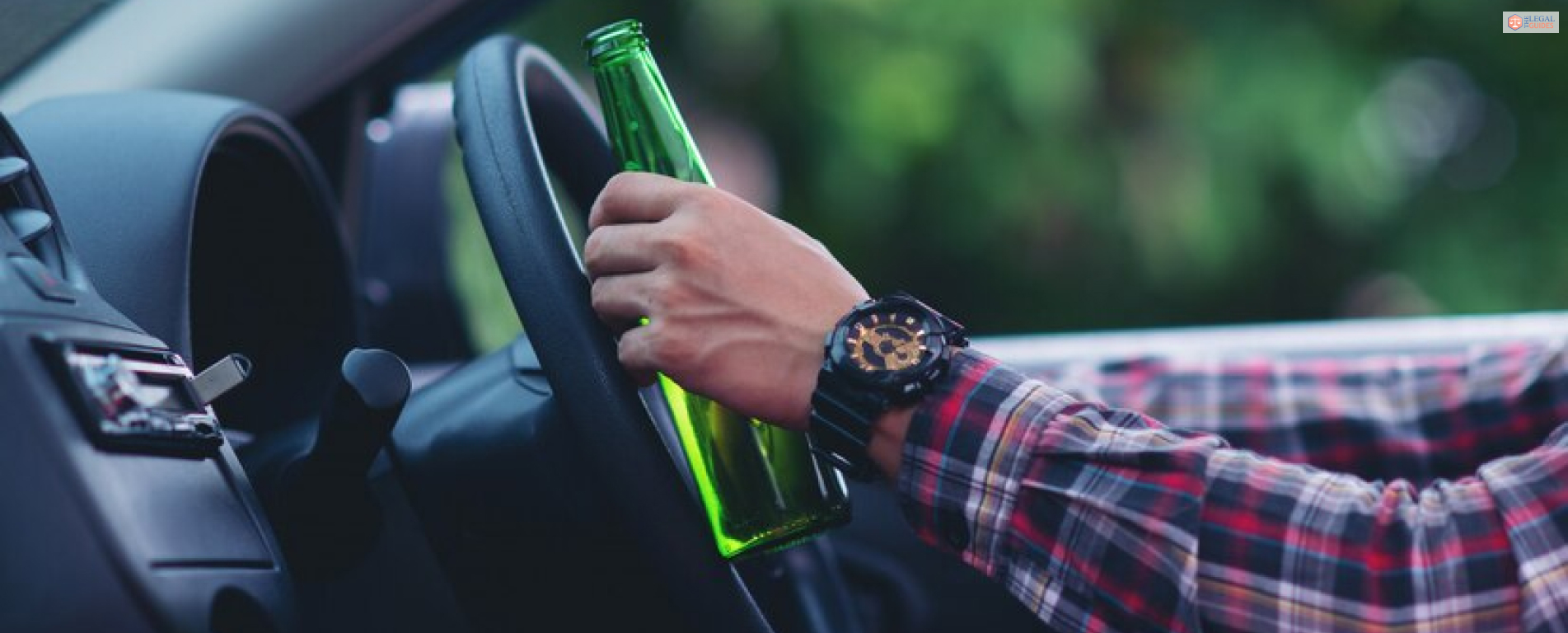- Alcohol is a major reason or contributor when it comes to boating accidents as well as fatalities in Florida.
- The BAC level for boaters to be charged with “under the influence” is the same as it is for motorists and drivers.
- The penalties for facing BUI charges can range from $1,000 fine to imprisonment for upto 5 years and suspension of license.
When it comes to DUI charges, most of us already know that the BAC levels cannot be more than 0.8. But what about BUI? At what breath alcohol level would a boater be considered “under the influence” in Florida?
Many people don’t realize that Florida has specific laws for Boating Under the Influence (BUI). For starters, it is illegal for boaters to operate any vessel when intoxicated.
And while it is true that the legal breath alcohol limit for boaters is similar to that of drivers and motorists, it is not exactly the same as DUI laws.
In this article, I will break down:
- The legal breath alcohol concentration (BAC) limit for boaters in Florida.
- What happens if you’re caught over the limit.
- Penalties and consequences for BUI.
- Differences between BUI and DUI laws.
- Steps to protect yourself legally.
By the end, you’ll know exactly how Florida law treats boating under the influence and what you can do to stay safe — and out of trouble — on the water. And if these are the things that you want to know, then keep reading…
What Is “Boating Under the Influence” (BUI) in Florida?

Florida’s BUI law is outlined in Florida Statutes Section 327.35, which makes it illegal to operate a vessel while impaired by alcohol or drugs. This includes motorboats, sailboats, jet skis, and other personal watercraft.
You can be considered “under the influence” in two main situations:
- If your normal faculties are impaired — meaning your ability to see, hear, walk, talk, or make judgments is affected by alcohol or drugs.
- If your breath or blood alcohol concentration (BAC) meets or exceeds the legal limit — which I will explain in detail below.
According to Boat-ed, not only is it illegal to operate a vessel under the influence of alcohol, but it is also illegal to “manipulate any water skis, sailboard, or similar device while intoxicated due to alcohol or any combination of alcohol, a controlled substance, or drugs.”
Trivia: Boating under the Influence (BUI) became a federal offense, effective 13th January, 1988. The arrests under this offense fall directly under the jurisdiction of Federal authorities.
At What Breath Alcohol Level Would A Boater Be Considered “Under The Influence” In Florida?
According to a popular law firm in Tampa, Florida, “a boater is considered to be under the influence of alcohol on a per se basis if he or she has a blood or breath alcohol concentration (BAC) of .08 percent or above.”
In other words, in Florida, the legal BAC limit for boaters is 0.08% for adults. This means:
- If a breathalyzer test shows your BAC is 0.08% or higher, you are legally considered under the influence — even if you feel fine.
- For boaters under 21 years old, Florida has a zero-tolerance policy: a BAC of 0.02% or higher can result in penalties.
Trivia: The breathalyzer that BUI law enforcement officers use in Florida is called the Intoxilyzer 8000.
Additionally, even the Coast Guard enforces the federal law, which prohibits Boating under the Influence.
What Happens If You’re Over the Legal Limit?
If it is found that your vessel’s BAC is at or above the legal limit in Florida, you are chargeable with BUI, and law enforcement officers can arrest you.
They may stop your boat, test your sobriety, and so on if they believe you are under the influence.
This is the general procedure that takes place if you are caught with a high BAC level while boating:
- Initial stop: The police may intercept you due to erratic boating, a safety checkpoint, or a violation of the traffic code.
- Observation & field sobriety tests: The coordination exercises may be asked of you to perform.
- Breathalyzer or blood test: If your BAC is found to be over the legal limit, you are free to be taken into custody.
- Charges & penalties: According to your record and the seriousness of the case, the penalty can be a fine, jail, or more.
As per Sammis Law Firm, “Florida law enforcement officers typically make an arrest for Boating Under the Influence (BUI) closer to the shore or on lakes and rivers. That crime is prosecuted in Florida state courts.”
Penalties for Boating Under the Influence in Florida

The consequences of a BUI conviction can be serious, and penalties increase for repeat offenses or if someone is injured.
First Offense
- Fine: $500 to $1,000
- Jail: Up to 6 months
- Probation: Up to 1 year
- Community service: 50 hours
- Mandatory substance abuse evaluation and possible treatment
Second Offense
- Fine: $1,000 to $2,000
- Jail: Up to 9 months (minimum 10 days if within 5 years of first offense)
- Probation and substance abuse treatment requirements
Third Offense
- If within 10 years of a prior conviction: Felony charge
- Up to 5 years in prison
- Fine: Up to $5,000
Aggravating Factors That Increase Penalties
Certain circumstances can make BUI penalties harsher, even for a first offense:
- BAC of 0.15% or higher (nearly double the legal limit)
- Causing property damage or injury
- Having a passenger under 18 years old on board
- Causing a serious injury (felony)
- Causing a fatality (BUI manslaughter — up to 15 years in prison)
When Do BUI Officers Stop A Boat?
In case you did not know, the BUI officers can stop you while you are on the boat, the moment they think they have probable cause to do so. Most of the time, these causes include things that visibly violate certain boating rules as well as speeding.
According to Sammis Law Firm, “the BUI officers can stop a boat for a random inspection related to an equipment check, fishing compliance, or safety registration.”
Additionally, section 327.56, Fla. Stat, authorizes the boating officers to stop and inspect your vessel. However, the officers are generally not allowed to board the specific boat until and unless the operator is unable to show them the safety equipment necessary for boating under the law.
In such a case, the officer might ask the operator of the boat to go through a breathalyzer test or perform certain sobriety tests.
BUI vs DUI: Key Differences in Florida
While the BAC limit for both boating and driving is 0.08%, there are some important differences:
- Location: DUI laws apply to public roads; BUI laws apply to waterways.
- Stops: On the water, officers can stop you without probable cause if conducting safety checks.
- Testing: Refusing a breath test in a DUI case usually results in license suspension, but in BUI cases, the penalties differ (although refusal can still be used as evidence in court).
How Law Enforcement Tests for BUI in Florida
Officers may use:
- Field sobriety tests adapted for boating (since balance is affected by being on water).
- Breathalyzer to measure BAC.
- Blood or urine tests if drugs are suspected.
How to Avoid a BUI Charge in Florida
If you’re planning to enjoy alcohol while on the water:
- Designate a sober operator before leaving shore.
- Know your limits and drink responsibly.
- Wait before driving — alcohol affects you more in the sun and heat.
- Stay hydrated and eat food while drinking.
Legal Defenses Against a BUI Charge
If you’re facing BUI charges, possible defenses may include:
- Challenging the stop — Was it conducted legally?
- Questioning the BAC results — Breathalyzers can give false readings if not properly calibrated.
- Arguing lack of impairment — BAC alone isn’t always conclusive.
Frequently Asked Questions (FAQs):
Here are some of the questions that most people often ask about the breath alcohol level at which a boater would be considered “under the influence” in Florida:
1. Is The BAC Limit The Same For All Types Of Boats?
Yes, the 0.08% BAC limit applies to and is the same for all vessels on water. These include motorboats, sailboats, as well as jet skis.
2. Can I Lose My Driver’s License For A BUI?
No, you cannot lose your driver’s license directly. However, a BUI conviction can still appear on your criminal record. This will eventually impact other legal matters in the future.
3. Is It Legal To Drink Alcohol On A Boat In Florida?
Yes, as a passenger, you can most definitely drink alcohol on a boat. However, if you are the operator or the driver of the boat who has the power to manipulate the course of the vessel, you must remain under the legal BAC limit.
4. Do Out-of-State Visitors Have To Follow Florida’s BUI Laws?
Yes, even if you are from some other state and are in Florida for a while and are boating in Florida waters, the Florida law related to boating still applies regardless of where you live.
5. What If I Refuse A Breath Test?
If you refuse a breathalyzer test, it can result in fines. Additionally, law enforcement can use it as evidence against you, even if it’s not an automatic license suspension like in DUI cases.
Read Also:















